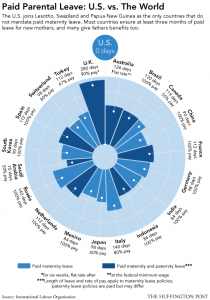It’s astounding and outrageous that the United States continues to be one of the only developed countries in the world that doesn’t mandate a guaranteed paid maternity leave for its working mothers. A paid maternity leave is essential in helping to ensure that all American women have the ability to realize their full potential within their careers. Since this issue persists within the public sphere of employment, it is worthy of our discussion.
Let’s first discuss how insufficient the current protected parental leave period is in the United States. Though no paid leave is guaranteed, new parents are permitted 12 weeks off after the birth of their child before returning to work. However, this is only if certain stipulations are met. The 12 week leave is mandated by the Family and Medical Leave Act of 1993, which only guarantees time off to employees who have been with a company for a year, worked at least 1,250 hours during that year, and work for a company that has 50 or more employees. Thus, an estimated 40% of U.S. employees are not entitled to any sort of parental leave. Individual employers may decided to permit more time off, but this is not required. For those who do receive the 12 weeks off, this period is abysmally low compared to other developed countries.

The result is that women are barred from reaching their full potential in the workplace. For many women, 12 weeks is simply not enough time to recover emotionally or physically from labor, or to properly care for their child in the earliest stages of development. This often means that a new mother can’t return to work when her 12 weeks are up (if she was given any maternal leave at all) and is forced to quit her job. When she does return to the workforce, if she is even able to do so, she’ll face many barriers. First, she will need to find a new job after quitting her previous employer. If she had earned any promotions or raises, or worked up the corporation ladder at her previous workplace, she will now find herself once again at the lowest level of employment. She will also be several steps behind her male counterparts, or other women without children.
Even if a woman does receive adequate time off from work after having a child, it’s unlikely that she receives a paid leave. Giving a new parent paid time off is not required of any employer in the United States. If a woman isn’t earning an income while recovering from labor and caring for her newborn, her male partner often steps in to work more and become the sole breadwinner. This reinforces antiquated gender dynamiques that trap women in the role of home-maker; preventing women from pursuing their goals and reaching their full potential. The consequences of unpaid maternity leave are even more severe for single mothers, who may find themselves with no source of income at all after giving birth. Being barred from an income as a consequence of the biological necessities of reproduction is a truly egregious infringement on the rights of women.
It’s clear that the lack of a maternity leave infringes on a woman’s liberty to pursue a career and thus establish her own financial security. A woman’s biological predisposition for having children should never interfere with her rights to realizing her true potential. It’s high time that the United States mandates a paid maternity leave, and thus liberates its women.

